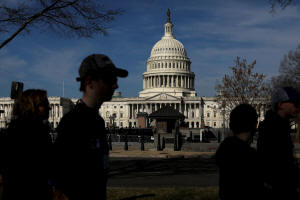U.S. Democrats to 'go after' oil companies over gasoline prices
 Send a link to a friend
Send a link to a friend
 [April 29, 2022]
By Richard Cowan and Diane Bartz [April 29, 2022]
By Richard Cowan and Diane Bartz
WASHINGTON (Reuters) -Democrats in
Congress, accusing oil companies of gouging and profiteering that has
raised gasoline prices, on Thursday promised legislation to allow the
U.S. Federal Trade Commission and state attorneys general to go after
them.
"It would give the FTC and the state AG's increased authority, including
civil penalty authority, to go after oil companies and retailers that
are gouging their customers and would cover both wholesale and retail
sales," House Energy and Commerce Committee Chairman Frank Pallone told
reporters.
With opinion polls showing Americans concerned about high prices for
energy, food and other consumer goods, Senate Democratic Majority Leader
Chuck Schumer said legislation to lower retail gasoline prices "is at
the very top of our list."
House of Representatives Speaker Nancy Pelosi, also a Democrat, said
lowering the price of gasoline at the pump would have the ripple effect
of easing rising prices on other goods because of transportation costs.

With congressional elections six months away, Republicans are anchoring
their bid to seize majority control of the House and Senate by blaming
President Joe Biden and his fellow Democrats in Congress for spending so
much money addressing the COVID-19 pandemic and bolstering the economy
that it ignited inflation.
Retail gasoline prices in the United States are now around $4.20 per
gallon, up from about $2.96 a year ago. The oil industry says price
rises are not arbitrary but determined by market forces.
Neither Schumer nor Pelosi would say when such legislation will be voted
upon or how much money it could end up saving consumers if enacted into
law.
"Big Oil has profiteered and exploited the marketplace," Pelosi told
reporters, citing companies' strong corporate profits over the past
year. "They are hoarding the windfall while keeping prices high at the
pump," she added.
The FTC already has the power to take action against those who
manipulate wholesale oil markets by making it illegal to report false
information to inflate prices.
Legislation now being drafted by Senate and House committees would
double the penalty for manipulating these markets to $2 million per day
per violation.
According to a draft of the legislation, the FTC could enforce similar
rules in retail markets and include biofuels. It would create a new FTC
unit to monitor and analyze the prices of crude oil, gasoline, diesel,
home heating oil and others.
[to top of second column]
|

Pedestrians walk by the United States Capitol building in
Washington, U.S. March 15, 2022. REUTERS/Emily Elconin/File Photo
 The FTC declined to comment on the
evolving legislation.
The agency is regularly asked to probe gasoline prices at times when
consumers are paying more at the pump and regularly reports that it
has found no wrongdoing, said Henry Su, a veteran of the FTC now at
the law firm Bradley Arant Boult Cummings LLP.
Once legislation is sent to the full House and Senate for debate and
votes, it is unclear whether Democrats will be able to attract
enough Republican support for passage, especially in the Senate
where the chamber is divided 50-50 by party and Democratic Vice
President Kamala Harris at times casts tie-breaking votes.
Most legislation needs at least 60 votes to clear Senate procedural
hurdles, unless Democrats employ a difficult "reconciliation"
strategy allowing some measures to pass by simple majority vote.
Noticeably absent from Schumer and Pelosi's attack on gasoline
prices was any effort to suspend the federal gasoline tax or give
consumers vouchers to help them pay for the fuel.
As domestic fuel prices have risen, especially after Russia's Feb.
24 assault on Ukraine, Democrats have tried to place the blame on
two international actors: Russian President Vladimir Putin for the
war that has resulted in supply disruptions and sanctions against
Moscow linked to some price increases and an oil industry it accuses
of tamping down production while enriching investors through stock
buybacks.
On Thursday, Schumer called the major oil companies "vultures."

The oil industry's American Petroleum Institute on its website
ascribes higher prices to a global supply crunch, workforce
constraints, instability in Eastern Europe and an economic rebound
as the United States emerges from the effects of the coronavirus
pandemic.
(Reporting by Richard Cowan, Doina Chiacu, Diane Bartz and David
Shepardson; Editing by Franklin Paul, Bill Berkrot and Howard Goller)
[© 2022 Thomson Reuters. All rights
reserved.] This
material may not be published, broadcast, rewritten or
redistributed.
Thompson Reuters is solely responsible for this content. |